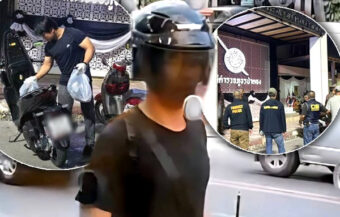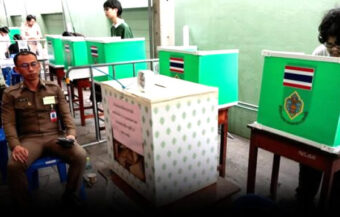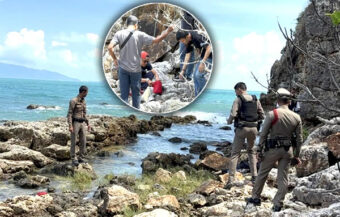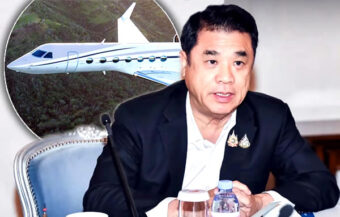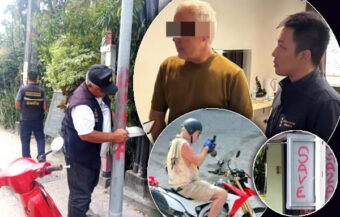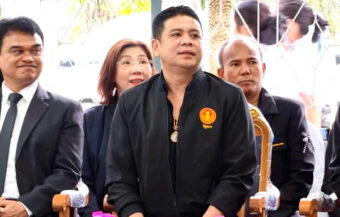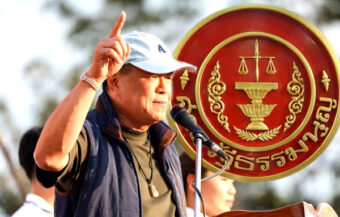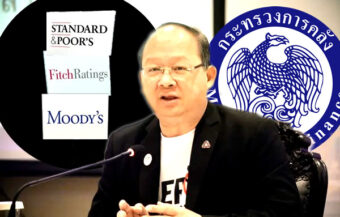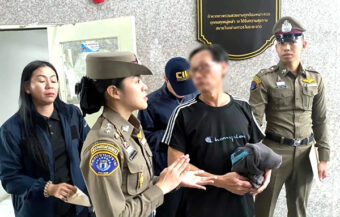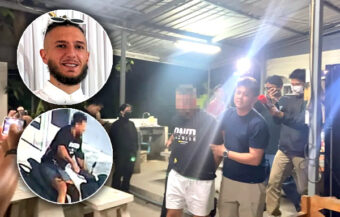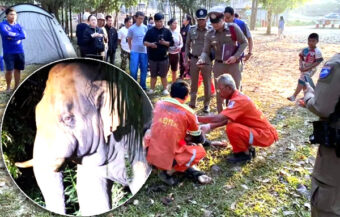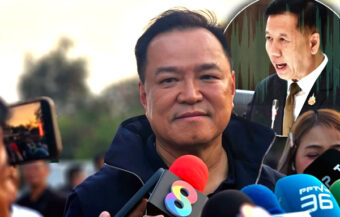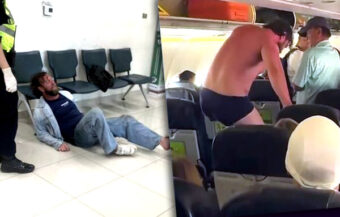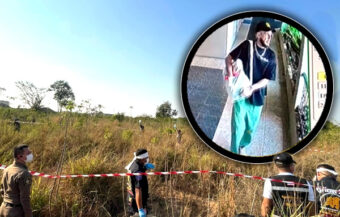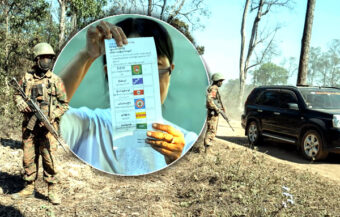Thai border provinces remain on edge with nightly patrols, a nationwide drone ban and spy arrests after Cambodian attacks displaced over 100,000. Cambodia continues troop movements and threats, while Thailand strengthens security amid ongoing tensions and rising drone activity.
Thousands of Thai residents remain displaced after Cambodian attacks on civilian areas from July 24 to 28. The Phnom Penh regime floods the media with daily threats and disinformation, while Cambodian forces keep shifting positions. On Sunday, Thailand banned drones nationwide after a swarm targeted government buildings and military bases. Nightly military patrols are now the norm as security agencies hunt for spies and shut down emerging threats.
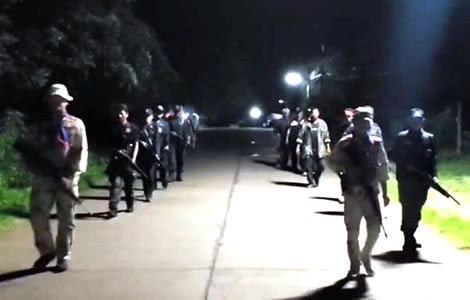
Sisaket, Thailand – Tension continues to rise along Thailand’s border with Cambodia. The situation remains especially fragile in Sisaket and Surin provinces. These areas were hit hardest during the clashes from July 24 to 28, before the ceasefire took effect. According to the Royal Thai Army, over one hundred thousand people have not yet returned home.
Many residents are still sheltering in government facilities. Others have moved in with relatives or remain scattered across safer areas. Most say they fear renewed attacks. Rocket and artillery fire from Cambodian forces displaced thousands in a matter of hours.
Sisaket and Surin provinces remain fragile after clashes, with over 100,000 displaced unable to return home
As a result, authorities have ramped up security measures. Thai forces are on high alert, especially in the four red zone districts of Sisaket: Kantharalak, Khun Han, Phu Sing and Khukhan. These districts sit near the Cambodian border and are most vulnerable to renewed hostilities.
Military and civilian agencies are coordinating closely. In Khun Han district alone, 19 villages are now under continuous surveillance. Volunteer Defence Corps (VDC), Village Security Guards (VSG), and local officials have set up checkpoints at every entry and exit route. Patrols have doubled in frequency. They are monitoring the movement of people and watching for aerial threats.
On Sunday evening, one such threat appeared. At 8:00 p.m., a mysterious drone was spotted flying above a village in Khun Han. It hovered briefly, then moved inland. Security teams immediately tracked its flight path. The drone disappeared before it could be intercepted.
Thai forces ramp up security in red zone districts near border, doubling patrols and setting up checkpoints
In response, Sisaket Governor Anupong Suksomnit issued an emergency order. All relevant agencies were instructed to enforce the highest level of security. The directive included several specific actions. First, drone-catching nets were installed near key infrastructure. Second, CCTV cameras were repositioned to monitor airspace. Third, checkpoints were increased around power stations, telecommunications towers and gas stations.
Moreover, integrated forces were mobilised. Police, military and village-level defence volunteers began 24-hour patrols of sensitive areas. Armed personnel were granted permission to shoot down drones if they pose a threat. However, they must ensure civilian safety before firing. If any drone is shot down or a suspect arrested, the incident must be reported immediately to provincial headquarters.
Meanwhile, the province urged residents to remain calm. Officials asked the public not to panic if drones are spotted overhead. Instead, they should contact the emergency hotline 191 or notify nearby officials. Kamnans, village heads, or stationed military personnel are available to assist.
Sisaket governor orders highest security level with drone nets, CCTV shifts. Armed patrols authorised to shoot
Although no official confirmation was made about the drone’s origin, suspicions are high. Many believe it was sent from across the border. In fact, similar sightings have been reported in other border provinces.
For example, on Saturday, defence volunteers in Lahan Sai district of Buri Ram seized two drones. One had a camera attached. These drones were discovered near a military site. They were handed over to army intelligence for inspection.
Consequently, the Royal Thai Air Force issued a public warning. On its official Facebook page, the Air Force stated that drones are being used to spy on military installations. It called such actions espionage and a direct threat to national security.
The Air Force urged the public to report suspicious drones to the hotline 1374. Reports can also be submitted to local authorities at any hour. Authorities emphasised that swift communication could prevent attacks or sabotage.
Royal Thai Air Force warns public of espionage drones, urging constant vigilance and reporting
In addition, Lt. Gen. Boonsin Padklang, commander of the Second Army Area, took further steps. He instructed governors in all northeastern provinces to procure anti-drone equipment. Devices are to be used to protect provincial halls, arsenals, stadiums, police stations, bus terminals and airports.
Furthermore, the general ordered all security units to remain alert for unfamiliar individuals. Officers must investigate whether strangers could be linked to spying or planned attacks. This applies especially to border regions with heavy foot traffic.
According to military reports, multiple Cambodian nationals have already been arrested. They are suspected of acting as spies for the Phnom Penh government. Investigations are ongoing.
At the same time, there are growing concerns about renewed Cambodian military activity. The Second Army Region confirmed it observed “continuous movements” across the border. While no direct confrontations occurred, the activity has not slowed. Cambodia appears to be repositioning its forces.
Northeastern governors ordered to acquire anti-drone defences as military heightens border surveillance
Some believe these movements reflect internal tensions within Cambodia’s leadership. Prime Minister Hun Sen, Cambodia’s ageing ruler, has made a series of unusual claims. On Sunday night, the Cambodian Senate leader announced that the army had been put on overnight standby. He claimed an imminent Thai attack was expected.
However, Thai officials in Bangkok swiftly rejected the claim. They noted that Thailand’s diplomatic team was already in Kuala Lumpur for border talks. Many believe Hun Sen’s statements are aimed at stirring nationalist sentiment or distracting from domestic criticism.
Observers say Hun Sen may be increasingly nervous about the July 24–28 clashes. Cambodia suffered significant losses. Moreover, signs of dissatisfaction are reportedly growing within the Cambodian military. Thai intelligence sources suggest low morale and internal divisions may be emerging.
Despite the ceasefire, the Thai military remains on constant alert. According to a Sunday update from the Second Army Region, 495 shelters are still operational. These shelters currently house around 100,270 displaced residents. Conditions vary, but food, medicine and support are being provided daily.
Hun Sen’s claims of Thai attack readiness met with scepticism as Cambodian forces reposition
Royal agencies have taken a lead role in supporting the displaced. Members of the royal family have sent aid and funded medical care. Meals are freshly prepared each day. Doctors perform routine checkups. Children are given recreational activities to ease their trauma.
Explosive ordnance disposal (EOD) teams are also active. Seventeen of the sixty-three areas hit by Cambodian rocket fire have been cleared of unexploded munitions. The effort continues.
Meanwhile, His Majesty the King has ordered the rapid rehabilitation of damaged infrastructure. One poignant example is the case of Private First Class Theerayut Krachangthong. The 22-year-old soldier was killed at Tahong 2 base during the clashes. His family, who lived in a shack without water or electricity, will now receive a new home funded by the palace.
Funerals for fallen soldiers and civilians are being held with royal sponsorship. Donated supplies from across Thailand are being sent to frontline troops. Moral support from the public remains strong.
At the national level, the Civil Aviation Authority of Thailand has banned all civilian drone operations. The ban is effective nationwide. Any unauthorised drone will be considered a threat and may be destroyed.
Royal family and agencies provide vital aid to the displaced while a drone ban takes effect nationwide
Government spokesman Jirayu Houngsub confirmed that, as of Sunday, no new violent incidents were reported. However, authorities remain cautious. Reinforcements from Cambodia have been spotted near the frontier.
Although the GBC meeting in Malaysia offers a diplomatic avenue, tension remains thick on the ground. Thai soldiers patrol the roads nightly in Sisaket. Villages close to the border report an atmosphere of anxiety and fear. Many residents remain sleepless, worried that fighting could resume at any moment.
World hears what happened in Sisaket. Cambodia used Chinese rocket systems to target civilians in a war crime
Nevertheless, Thai officials stress that the situation is under control. Forces remain well-positioned. Patrols are active. Surveillance is constant. Military commanders continue to provide daily briefings.
For now, residents are encouraged to remain alert but calm. As one local official put it, “We have been through worse. We are ready for anything.”
With cross-border tensions still simmering and drone activity on the rise, Thailand is preparing for all possible outcomes—whether through diplomacy or defence.
Join the Thai News forum, follow Thai Examiner on Facebook here
Receive all our stories as they come out on Telegram here
Follow Thai Examiner here
Further reading:
Cabinet meets after Cambodian ceasefire. Acting PM Phumtham spoke later with Trump for 30 minutes
Acting PM travels to Kuala Lumpur for ceasefire talks. Cambodia’s PM Hun Manet to attend amid PR war
Hot War rages on the Thai-Cambodian border following Cambodian troops offensive in Chong Bok area

